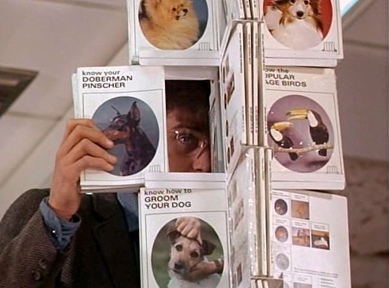Greetings
Brian De Palma was never reluctant to admit that he was a peeping tom. In the documentary DE PALMA, he described those times in his younger years, following his father around town, spying on his illicit affairs. When he began making movies in the 1960s, his voyeurism found the perfect medium. While his 1968 feature GREETINGS recalls Hitchcock's REAR WINDOW at times, the movie owes a bit more to Jean- Luc Godard. The sped up photography (which also may owe a debt to Richard Lester). The jump cuts. Use of lighting. The philosophical discourse.
Three young New Yorkers desperately try to avoid Vietnam, and spend hours fighting slumber to dream up methods to elude the Draft. They'll insult African Americans (though, this being the late '60s, they're not exactly referred to that way) in bars to get beaten up. Pretend to be homosexual. Jonathan Warden is Paul, a lonely heart who tries computer dating. De Palma regular Gerit Graham is Lloyd, a verbose conspiracy theorist obsessed with the Warren Commission report. He demonstrates the "magic bullet theory" on the sleepy, naked body of one of Paul's failed dates. Then there's Jon, played by Robert De Niro, a would-be filmmaker who is the De Palma alter ego. Copping a peek at women in bookstores, then tracking them down to tell them they are just right for a movie he's making.
The centerpiece of GREETINGS is unmistakably with Jon and his subject, a shoplifter named Linda (Ruth Alda). Off camera, we hear him direct her in a scene, gradually convincing her to remove her clothes. I recall another bit like this in De Palma's MURDER A LA MODE. How about the final moments, with Jon in a Vietnam jungle ostensibly about to fire upon a woman with his rifle for the benefit of a war correspondent and camera crew? GREETINGS even features Jon reading aloud out of a book, describing peeping tom behavior. It's almost a Godardian, almost a Brechtian Distanciation type of scene.
GREETINGS is an intriguing mess of a movie. Each scene is more or less a lengthy monologue, with some unfortunate sharing the moment and suffering. Allen Garfield is funny as a smut peddler who sells Jon a 16mm porno, which we get to glimpse and may explain why this film originally received an X-rating. Roz Kelly plays an aggressive photographer, perhaps giving Jon a taste of his own poison. De Niro dominates the later scenes and shows considerable talent even at this early stage. So does De Palma, creating an authentic aesthetic of NYC life in the psychedelic years that works intrinsically. If the movie fails as a social and political satire, or simply a comically angry fist shake at the Establishment, it has value as a historical document. The elements of cinema verite are generally successful.
The title song, performed by The Children of Paradise is played at least three times during the movie and sounds like warmed over Monkees with a dash of Dave Clark Five.



Comments